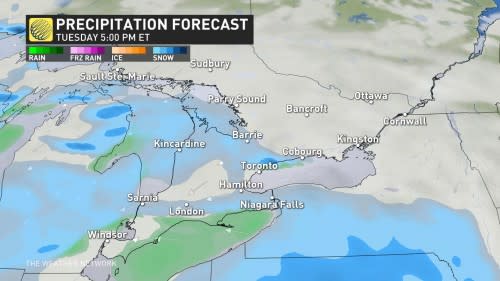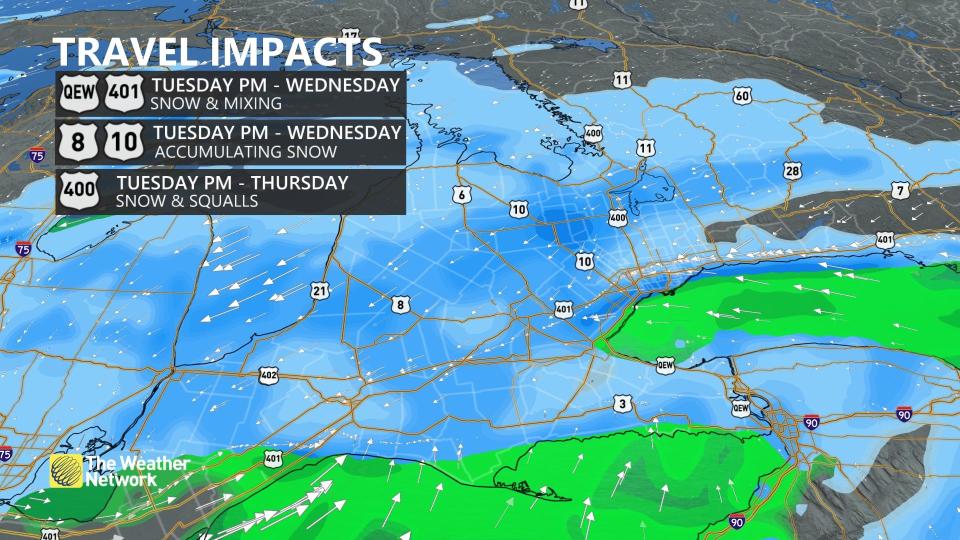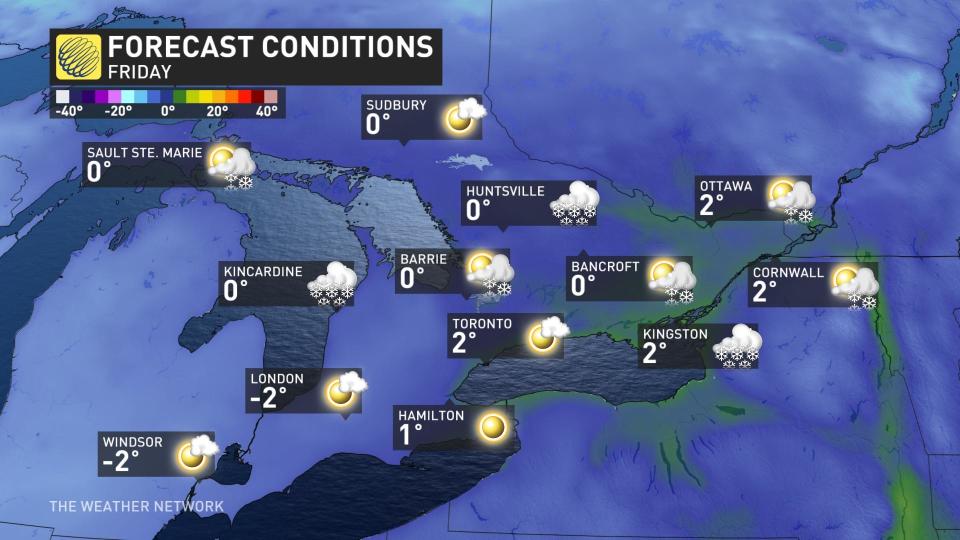GTA's first accumulating snow prompts winter weather travel advisory
After record-breaking, shorts-wearing balmy weather started out November, this mid point of the month will see winter arrive in a hurry.
The first multi-day snow squall event brought 20+ cm of snow to parts of the traditional snow belt regions over the weekend, and now some snow is taking aim at the Greater Toronto Area (GTA) through Wednesday. A snow squall is expected to develop and drift across the region, including Toronto, potentially disrupting the afternoon and evening commutes on Tuesday. This will be the precursor for another, more widespread event Tuesday night and Wednesday -- the first signs of accumulating snow associated with a system. As a result, a widespread winter weather travel advisory was issued, warning drivers to prepare for quickly changing and deteriorating travel conditions.
See what you'll need to prepare for, below.
This week: Multiple shots at snow with reinforced Arctic air
We have officially hit the mid-November mark and early winter-like weather will be hard to miss across southern Ontario this week.
On Tuesday, easterly winds blowing over Lake Ontario are forecast to develop a snow squall that will, at times, target parts of the GTA with brief bursts of snow, slick roads and reduced visibility.

The squall may meander around the shoreline communities through Tuesday with the target towards the Hamilton region, and western and southern parts of the Golden Horseshoe first before sliding north towards Toronto.
SEE ALSO: Toronto sets a new record for latest date below 0°C
Snowfall accumulations are highly variable on how intense the squall develops, how long it locks over a location and also the fact that roads versus grassy surfaces may accumulate snowfall at different rates.

That won't be it for the snow, either, as another round will move in with an inbound low-pressure system. This will bring more widespread accumulations to the region starting Tuesday and lasting through early Wednesday. It will be the first widespread, wet snow threat for southern Ontario this season, and will be the first snowfall for Montreal, Que., later on Wednesday.
Typical of mid-November events, temperatures will be marginal with accumulations highly impacted by elevation and distance from the Great Lakes. Between 5-10 cm of snow is possible for areas further away from the lakes, with less than 5 cm likely closer to the lake shores as some mixing and even rain is possible at times. In the areas where the lake-effect snow squall band sets up, it is possible for amounts to exceed the forecast and could be locally higher up to 15 cm.
"Prepare for quickly changing and deteriorating travel conditions," says Environment and Climate Change Canada (ECCC) in the winter weather travel advisory issued Tuesday morning. "Take extra care when walking or driving in affected areas. Slow down driving in slippery conditions. Watch for taillights ahead and maintain a safe following distance. If you must drive, be prepared for areas of poor visibility."

WATCH: Break out the shovels, Ontario, accumulating snow is on the way
DON'T MISS: Icy weather is inevitable. Here's what you need to prepare
Meanwhile, widespread below seasonal conditions are set to dominate this week and beyond, with another reinforcing shot of Arctic air and temperatures more typical of early December at times.

Temperatures on Friday and Saturday will be more typical of early to mid-December. Blustery conditions will end the week along with another round of lake-effect snow in the snowbelts.
'Crippling' lake-effect snow squall event to come
Lake-effect snow squalls will linger through the weekend and into early next week. This will be a high-impact, multi-day event.
"This will cripple travel for the highest impacted areas east of Georgian Bay and Lake Huron, especially near the Bruce Peninsula and from the Gravenhurst area to north of Parry Sound," says Dr. Doug Gillham, a meteorologist at The Weather Network.
The hardest-hit regions could be the Buffalo and Watertown areas, with the potential for snow totals between 50-80+ cm.
It's officially mid-November and we're wondering: Have you made the switch to winter tires yet? ❄🚗 #TWNPoll
It's officially mid-November and we're wondering: Have you made the switch to winter tires yet? ❄🚗 The Weather Network on Twitter: "It's officially mid-November and we're wondering: Have you made the switch to winter tires yet? ❄🚗 #TWNPoll / Twitter"
— The Weather Network (@weathernetwork) The Weather Network on Twitter: "It's officially mid-November and we're wondering: Have you made the switch to winter tires yet? ❄🚗 #TWNPoll / Twitter"
"We will closely watch southern parts of the Niagara region as the heavy snow squall could drift north into this region at times, especially Thursday night and Friday and again Saturday night into Sunday," adds Gillham. Between 30-50 cm of snow is possible between Niagara Falls and Fort Erie."
WATCH: These snow squalls gave southern Ontario its first wintry weekend
Be sure to check back for the latest weather updates across Ontario.


